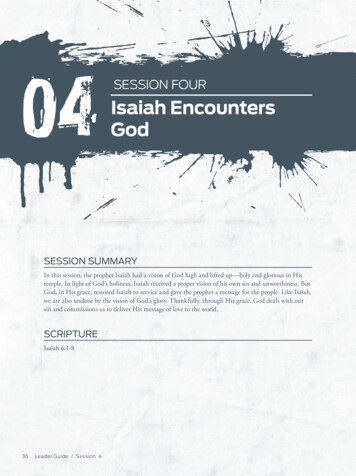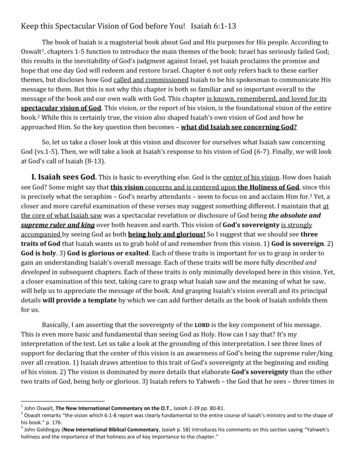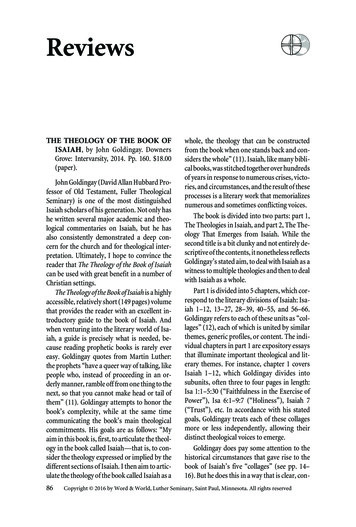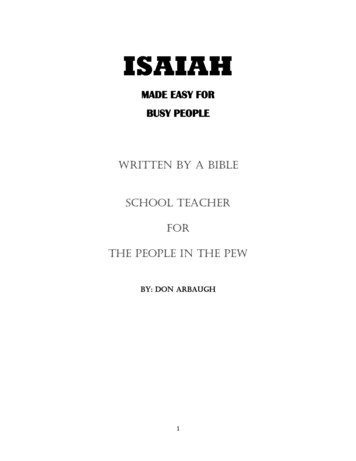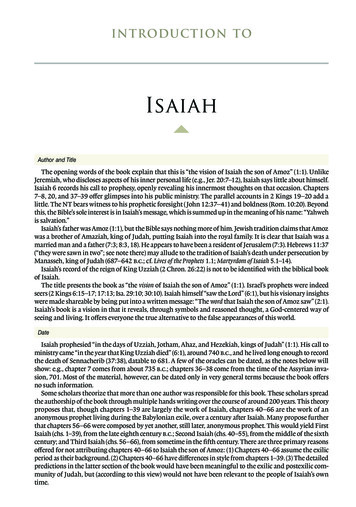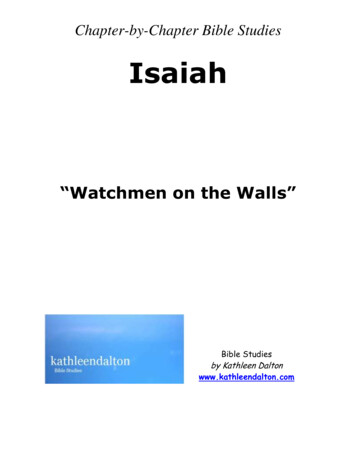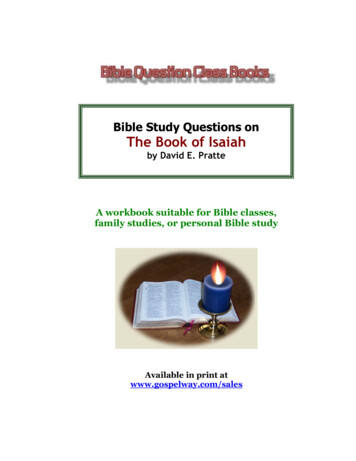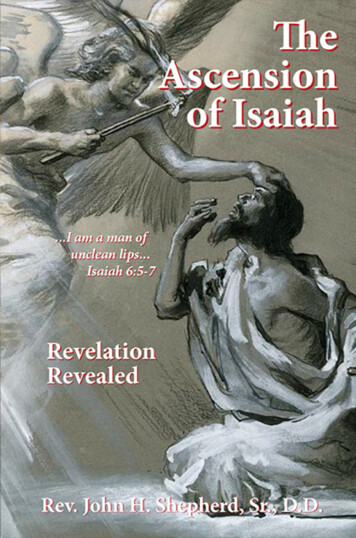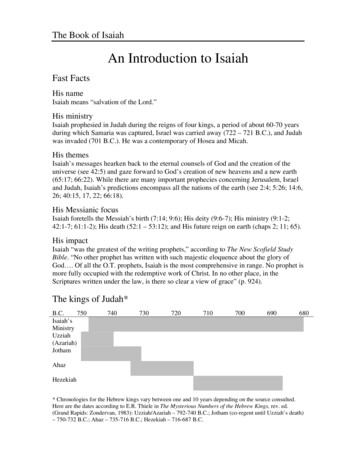
Transcription
The Book of IsaiahAn Introduction to IsaiahFast FactsHis nameIsaiah means “salvation of the Lord.”His ministryIsaiah prophesied in Judah during the reigns of four kings, a period of about 60-70 yearsduring which Samaria was captured, Israel was carried away (722 – 721 B.C.), and Judahwas invaded (701 B.C.). He was a contemporary of Hosea and Micah.His themesIsaiah’s messages hearken back to the eternal counsels of God and the creation of theuniverse (see 42:5) and gaze forward to God’s creation of new heavens and a new earth(65:17; 66:22). While there are many important prophecies concerning Jerusalem, Israeland Judah, Isaiah’s predictions encompass all the nations of the earth (see 2:4; 5:26; 14:6,26; 40:15, 17, 22; 66:18).His Messianic focusIsaiah foretells the Messiah’s birth (7:14; 9:6); His deity (9:6-7); His ministry (9:1-2;42:1-7; 61:1-2); His death (52:1 – 53:12); and His future reign on earth (chaps 2; 11; 65).His impactIsaiah “was the greatest of the writing prophets,” according to The New Scofield StudyBible. “No other prophet has written with such majestic eloquence about the glory ofGod . Of all the O.T. prophets, Isaiah is the most comprehensive in range. No prophet ismore fully occupied with the redemptive work of Christ. In no other place, in theScriptures written under the law, is there so clear a view of grace” (p. 924).The kings of am740730720710700690680AhazHezekiah* Chronologies for the Hebrew kings vary between one and 10 years depending on the source consulted.Here are the dates according to E.R. Thiele in The Mysterious Numbers of the Hebrew Kings, rev. ed.(Grand Rapids: Zondervan, 1983): Uzziah/Azariah – 792-740 B.C.; Jotham (co-regent until Uzziah’s death)– 750-732 B.C.; Ahaz – 735-716 B.C.; Hezekiah – 716-687 B.C.
Introduction to Isaiah / Page 2Uzziah and JothamIsa. 1:1 tells us the prophet’s ministry began during the time of Uzziah and his sonJotham. It is likely that Isaiah began late in Uzziah’s reign, after he had attainedsubstantial wealth and military success, perhaps between 750-740 B.C. At this timeJotham was coregent and running the country because Uzziah was leprous and thereforesecluded. Uzziah’s success early in his kingship was due to his willingness to listen to theprophet Zechariah, who taught him God’s ways. As a result, Uzziah is listed as one ofJudah’s kings who “did what was right in the Lord’s sight” (2 Chron. 26:4-5). But hislegacy began a downward spiral when he arrogantly entered the temple in Jerusalem andburned incense to God, despite warnings from 80 priests. As a result, God struck Uzziahwith leprosy (2 Chron. 26:16-20) and his son Jotham ruled as coregent for about 10 yearsuntil Uzziah died around 740 B.C.AhazReligious life in Judah deteriorated significantly during the reign of Azah, who “did notdo what was right in the Lord’s sight he walked in the ways of the kings of Israel andmade cast images of the Baals. He burned incense in the Valley of Hinnom and burnedhis children in the fire, imitating the detestable practices of the nations the Lord haddispossessed before the Israelites” (2 Chron. 28:1-3). His lack of faith in God wasillustrated graphically when he failed to trust God despite the promise of military victory(Isa. 7:1-9).HezekiahHezekiah was a great religious reformer, a man of faith who led his armies to trust in Godfor deliverance (2 Chron. 32:6-8), and who did so himself when he asked God to deliverthe Jews from the Assyrians (2 Chron. 32:20-21). In the first year of his reign, he repairedthe temple, consecrated priests, renewed the nation’s covenant with God, removed paganelements his father brought into the temple area, and restored worship (see 2 Chron. 29:311, 15-36). Although he later was puffed up with pride for a time, he quickly repented,and God blessed him with great riches (2 Chron. 32:27-29).The prophet IsaiahIt’s difficult to get a full picture of the prophet because his writings reveal very littleabout his personal life. We do know that Isaiah identifies his father as Amoz, who mayhave been a scribe in the king’s court. Jewish tradition suggests that Amoz was thebrother of King Amaziah, the father of Uzziah, but there is no way to substantiate this.Isaiah’s wife is called a prophetess (8:3), but there is no record of her propheticmessages, so it’s possible the term simply identifies her with Isaiah. Isaiah and his wifehave at least two sons (7:3; 8:3), but little is known of them.A high point in Isaiah’s ministry comes in chapter 6 when he meets with God. Hedespises his uncleanness and confesses his sinfulness as he catches a glimpse of the gloryof God (6:1-4). He then confesses the sins of the people of Judah and responds to thedivine call to take God’s message to the people (6:6-8). Gary V. Smith comments, “Isaiahdid not know the nature of the mission God designed for the one being sent, the length of
Introduction to Isaiah / Page 3the responsibility, where this person must go, the message that must be spoken, or thedifficulty of the task that must be accomplished. Nevertheless, Isaiah immediatelyvolunteered. He did not make excuses or question God’s plan like Moses or Jeremiah(Exod. 3:11; 4:1, 10; Jer. 1:6) but gladly offered to serve God” (The New AmericanCommentary: An Exegetical and Theological Exposition of Holy Scripture, Isaiah 1-36,p. 36).It is important to note that Isaiah is sent to bring hardness to the hearts of the people ofJudah (6:9-10). The Lord states plainly that the future is dark for His people, but there ishope (6:11-13). This is illustrated in Isaiah’s encounter with Ahaz in chapter 7. Godinstructs Isaiah to bring the wicked and wildly outnumbered king hope of God’sdeliverance in the upcoming Syro-Ephraimite War. Rather than trusting God, however,Ahaz hardens his heart and refuses to invite God to grant a sign (7:10-13).Isaiah obediently serves the Lord even when the assignments seem bizarre. For example,he is told to go naked in public for parts of three years (20:2). This symbolizes whatwould happen to the inhabitants of Judah if taken captive in war; normally, war captivesare stripped in shame. It isn’t known whether Isaiah explains his behavior to anyone inself defense, but the Lord calls Isaiah “my servant,” “a sign,” and “portent.” The impactof Isaiah’s ministry is felt far beyond the scope of his lifetime. He is quoted directly inthe New Testament more than 65 times, far more than any other Old Testament prophet,and is mentioned by name more than 20 times.Through a literary device known as “prophetic foreshortening,” Isaiah predicts futureevents without laying down exact sequences of the events or the time intervals separatingthem. For example, as John MacArthur writes, “nothing in Isaiah reveals the extendedperiod separating the two comings of the Messiah (cf. Is. 61:1, 2; Luke 4:17-22). Also, hedoes not provide as clear a distinction between the future temporal kingdom and theeternal kingdom as John does in Revelation 20:1-10; 21:1-22:5. In God’s program ofprogressive revelation, details of these relationships awaited a prophetic spokesman in alater time” (The MacArthur Bible Commentary, p. 757).In summary, Isaiah the person is known primarily through what he says, not what hedoes. His speeches focus on Judah’s wrong political policies as reflections of their lack oftrust in God. In ways similar to Joel, Obadiah, Micah, Nahum and Zephaniah, Isaiahoffers little biographical information about the prophet. Many of the Lord’s prophetsseem intentionally to downplay themselves in order to lift of God and His message.Tradition has it that Isaiah met his death under King Manasseh by being cut in two with awooden saw (see Heb. 11:37).
Introduction to Isaiah / Page 4An outline of studyCommentators approach the book of Isaiah in different ways, but generally we willpursue this simple outline:I.II.III.Judgment: Chapters 1-35Historical Interlude: Chapters 36-39Salvation: Chapters 40-66
The Book of IsaiahChapter 1: Judah on TrialPrologueWhere we are:Part 1: JudgmentChapters 1-35Part 2: Historical InterludeChapters 36-39Part 3: SalvationChapters 40-66When this takes place:Opinions vary, but it appears that Chapter 1 is written near the end of Isaiah’s ministry and isplaced at the start of the book as both an introduction and a summary. “This introduction is also amotivational attempt to convince [Isaiah’s] readers to acknowledge what God says and repent sothat their sins can be forgiven” (Gary V. Smith, New American Commentary, Isaiah 1-39, p. 93).Possibly, this chapter is written some time after the 701 B.C. attack by the Assyrians.Key verse:Isa. 1:18: "Come now, and let us reason together," Says the LORD, "Though your sins are asscarlet, They will be as white as snow; Though they are red like crimson, They will be like wool”(NASB).Quick summary:“Chapter 1 is God’s solemn call to the universe to come into the courtroom to hear God’s chargeagainst the nation Israel” (J. Vernon McGee, Isaiah Vol. 1, p. 17).Take note:Although Isaiah is identified as the prophet (v. 1), God is the source of the message. Note howGod speaks throughout the chapter: “ the Lord has spoken” (v. 2). “Hear the word of the Lord listen to the instruction of our God” (v. 10). “’What are your sacrifices to Me?’ asks the Lord” (v. 11). “’Come now, and let us reason together,’ says the Lord” (v. 18). “ the mouth of the Lord has spoken” (v. 20). “Therefore the Lord God of Hosts, the Mighty One of Israel, declares” (v. 24).Copyright 2008 by Rob Phillips
Judah on Trial / Page 2God’s case against Judah (Isa. 1:1-9)Isaiah begins by telling us what we are about to encounter: one vision, concerning two locations(Judah and Jerusalem), delivered during the time of four kings (Uzziah, Jotham, Ahaz andHezekiah). A powerful new nation has arisen to the north. Assyria is about to take the northernkingdom of Israel captive, and does so in 722. B.C. Later, God asserts that the brutal Assyrianinvaders will not take Judah. Rather, He is raising up another kingdom, Babylon, to judge thesouthern kingdom, but until then He is giving Judah one more chance to repent. Isaiah’s book iscalled a vision, suggesting that the prophet “saw” mentally and spiritually as well as heard whatGod communicated to him. The word “vision” also introduces the prophecies of Obadiah, Micah,and Nahum. The term “vision” (hazon) frequently refers to the general reception of a divinerevelation, without accompanying visual imagery; Isaiah’s use of the word “vision” implies thatwhat he is about to say comes from God.God calls heaven and earth into the courtroom to hear His case against Judah. The language inverse 2 is similar to the way Deuteronomy 32 begins. Having delivered the Jews from Egyptianbondage, the Lord lays down the conditions under which His people would inhabit the PromisedLand and calls heaven and earth as witnesses. If they fail to obey God, especially by engaging inthe worship of false gods, then Yahweh has the right to chasten them even to the point ofremoving them from the land. It was happening to Israel. Judah is next.The Lord uses satire in verse 3. He tells the Jews that two of the dumber beasts of burden, oxenand donkeys, know their masters and understand who feeds them, but the Jews live in oblivion tothe Lord’s providential care.Verse 4 lays out God’s description of who the Jews are and what they have done. They are asinful nation, a people weighed down with iniquity, a brood of evildoers, and depraved children.They have abandoned the Lord, despised the Holy One of Israel, and turned their backs on God.God has been chastening Judah according to Deuteronomy 28-29 and asks, “Why do you wantmore beatings? Why do you keep on rebelling?” (v. 5). Despite the Lord’s correction andgracious invitation to return to Him, the Jews will not repent, so the time for expulsion from theland is drawing nigh.“Isaiah first used the figure of a person who had been beaten and was bruised over his entirebody (Isa. 1:5-6). Though these untreated wounds welts, and open sores characterized thenation’s spiritual condition, Isaiah was also speaking of her condition militarily. They were beseton all sides by hostile forces and were losing some of their territory to foreign nations (v. 7).They should have realized that these terrible problems had come because of their spiritualcondition” (The Bible Knowledge Commentary).Isaiah depicts Jerusalem’s inhabitants as being like a shelter in a vineyard or a shack in acucumber field – temporary structures built to shade the sun from persons hired to guard thecrops against animals and thieves. Such huts were solitary and easily attacked. If not for aremnant of faithful Jews, Isaiah says, Judah already would have become like Sodom andGomorrah, totally devastated.
Judah on Trial / Page 3“I have had enough ” (Isa. 1:10-17)From a human perspective, the Lord’s words in these verses convey exasperation with Hispeople’s empty religious rituals. D.A. Carson comments, “Of all prophetic outbursts at religiousunreality this is the most powerful and sustained. Its vehemence is unsurpassed, even in Amos,and the form and content build up together. First, the offerings are rejected, then the offerers(11–12); but while God’s tone sharpens from distaste to revulsion, his specific accusation is heldback to the lurid end of v 15: Your hands are full of blood” (New Bible Commentary: 21stCentury Edition, Section Is. 1:10).The Lord is not abolishing, or even minimizing the importance of, the sacrificial system or thefeasts by which His people could approach Him and enjoy His fellowship; rather, He is refutingtheir assumption that sacrifices and religious observances, without pure motives and repentanthearts, could atone for their sins.Immediately following this thunderous rebuke are nine calls to repentance (vv. 16-17): Wash yourselves. Cleanse yourselves. Remove your evil deeds from My sight. Stop doing evil. Learn to do what is good. Seek justice. Correct the oppressor. Defend the rights of the fatherless. Plead the widow’s cause.J. Vernon McGee comments: “God has spelled out His charge against them. They are guilty ofspiritual apostasy. It led to moral awfulness and to political anarchy in the nation. God has calledIsrael into court and has proved His charge against them. Israel is like a prisoner standing at thebar waiting for the sentence of judgment. God can now move in to judge them” (McGee, p. 25).“Let us reason ” (Isa. 1:18-20)While some see chapter 1 as a courtroom setting, it’s probably more accurate to see it as anarraignment, where the Lord states His case against His people, anticipates their defense andrefutes it. Essentially, He tells Judah as well as all who witness His words that there isoverwhelming evidence to secure a conviction. But rather than go through with a trial, convictionand sentencing, God gives the Jews a chance to settle their case out of court.
Judah on Trial / Page 4The term “let us reason” is sometimes rendered “enter a lawsuit” or “let us test each other,” butthe basic meaning of the term is “to determine what is right.” Some translators favor the term “tosettle out of court.” There is graciousness here on God’s part, as well as an opportunity for theJewish people to “reach a settlement quickly” with their adversary (Matt. 5:25). The blessings ofrepentance and the curses of rebellion are clearly laid out: “If you are willing and obedient, youwill eat the good things of the land. But if you refuse and rebel, you will be devoured by thesword” (vv. 19-20).God’s use of the word “scarlet” is significant. The Hebrew word means “double-dyed,”emphasizing the deep-fixed permanency of sin in the people’s hearts. But there is hope. Thecolor of Jesus’ robe when bearing our sins was scarlet (see Matt. 27:28). So was the color of thecord that spared the life of Rahab and her family (Josh. 2:18), as was the color of the thread tiedto the scapegoat. The rabbis say that after the high priest confessed his sins and the people’s sinsover the scapegoat, the thread turned white. The miracle ceased, they say, 40 years before thedestruction of Jerusalem, coinciding with the crucifixion of Christ (Jamieson, Fausset, Brown,Commentary, Critical and Explanatory, on the Old and New Testaments, Isaiah 1:18).“I will burn away your dross” (Isa. 1:21-31)Verses 21-26 describe a theological cycle for Jerusalem. First, the city was faithful (v. 21a). Nowit is in rebellion (vv. 21b-23). God will purge the evil from Jerusalem with His refining fire (vv.24-25). Finally, the city will return to its faithfulness (v. 26). God compares Jerusalem in itsfaithfulness to silver and wine but says the silver is now dross and the wine is diluted with water.Sin has been welcomed into the city and into the hearts of its inhabitants and has corrupted both.The Lord spares no rebuke when he calls the leaders rebels, friends of thieves, and lovers of graft(v. 23).Therefore, God is determined to purify the city. He will satisfy His holiness (v. 24b), removeimpurity (v. 25), and restore His city (v. 26). His promise to Jerusalem is an encouragement tofaithful believers everywhere and at all times when they suffer through life at the hands of sinfuland selfish leaders. Gary V. Smith writes, “A day will soon come when God will transform thisworld, remove all sin, replace all evil leaders, and rule his kingdom in righteousness and justice.This passage is also a warning to every leader. You will be held accountable for how you leadthe people God has called you to serve” (p. 114).Closing thoughtIsaiah argues that God deals with sin in one of two ways. He removes the stain of sin if Hispeople repent (1:18-19), or he removes the sinner with His refining fire so His nation is purified(1:25-27). Does Judah repent? No, and as a result, she is carried away into Babylonian captivitya century later. Will we as God’s people repent of our sins or face chastisement? That is thefundamental question that nations and people must continue to answer.
The Book of IsaiahChapter 2: A Day of ReckoningPrologueWhere we are:Part 1: JudgmentChapters 1-35Part 2: Historical InterludeChapters 36-39Part 3: SalvationChapters 40-66When this takes place:Some commentators believe this chapter was written during the reign of Jotham or Ahaz becauseof the description of Judah in verses 6-8. But it may be better to consider King Uzziah’s reign,which was noted for its prosperity, power and pride. More specifically, Isaiah’s sermons inchapters 2-12 likely happened some time after the Syro-Ephraimite War in 734-32 B.C. In anycase, this prophecy was given during the early years of Isaiah’s 40730720710700690680Key verse:Isa. 2:12: For the LORD of hosts will have a day of reckoning against everyone who is proudand lofty and against everyone who is lifted up, that he may be abased. (NASB)Quick summary:The Lord will establish His kingdom on earth in “the last days,” and will executive judgment in a“day of reckoning.”Take note:It’s clear that chapter 2 addresses the future, particularly the last days. Note how Isaiah identifiesthis time: “the last days” (v. 2) “on that day” (v. 11) “a day belonging to the Lord of Hosts is [coming]” (HCSB) / “the Lord of Hosts willhave a day of reckoning” (NASB) (v. 12) “the Lord alone will be exalted on that day” (v. 17) “On that day” (v. 20) “when He rises to terrify the earth” (v. 21)Copyright 2008 by Rob Phillips
A Day of Reckoning / Page 2The city of peace (Isa. 2:1-4)The first four verses of this chapter describe a future day in which a final and lasting peacecomes to the inhabitants of Judah and Jerusalem. At least two things are clear: God is the Onewho establishes and maintains this lasting peace, and He does it in “the last days,” or, from aNew Testament perspective, in the days encompassing the first and second comings of Christ.The term “last days” is used at least 13 times in the Bible (HCSB) and describes the final periodof the world as we know it. In the Old Testament, the last days are anticipated as the age ofMessianic fulfillment (Isa. 2:2; Micah 4:1), while the New Testament writers considerthemselves living in the last days – the era of the gospel (Acts 2:17; Heb. 1:2). “The last days,then, are the days of the gospel of our Lord Jesus Christ. They are preliminary to and preparatoryfor the last day of final judgment of unbelievers and the dawn of eternal glory for believers”(Tyndale Bible Dictionary, p. 800).Gary V. Smith adds a cautionary note: “The phrase ‘in the last days’ cannot be associated withthe millennium or with the church age in Isaiah’s thinking, because such concepts were notknown to the prophet. He is simply talking about the last events in human history, when thekingdom of God would begin. New Testament readers must be careful not to read later NTinformation back into earlier texts and make them say things that God did not reveal to theprophets” (The New American Commentary: Isaiah 1-39, p. 129).The plural use of “days” implies a sustained length of time. While those living in Old Testamenttimes may have viewed the coming Messianic age as singular and continuous, New Testamentrevelation shows us that the Old Testament prophecies of the Messiah are to be fulfilled in twostages. First, Messiah will come as the Suffering Servant (Isa. 53), or Lamb of God (John 1:29).Then He will return one day as the Lion of Judah to defeat the wicked and establish His earthlykingdom (Rev. 19:11 – 20:6).Isaiah’s reference to the “mountain of the Lord” (v. 2) points to His kingdom, authority or rule.One day the kingdoms of men will become the kingdom of God (1 Cor. 15:24). Isaiah also drawsan analogy between the kingdom of God and the Temple on Mount Moriah, which towers abovethe countryside in Isaiah’s day. The kingdom of God will rise above, overshadow, and nullify thearrogant, warring and fleeting kingdoms of men. The prophet Daniel makes reference to thesedays when interpreting Nebuchadnezzar’s vision of the statue, which symbolized earthlykingdoms: “Then the iron, the fired clay, the bronze, the silver, and the gold were shattered andbecame like chaff from the summer threshing floors. The wind carried them away, and not atrace of them could be found. But the stone that struck the statue became a great mountain andfilled the whole earth” (Dan. 2:35; emphasis mine).The Lord Himself will settle disputes between nations. Ruling in majesty, power, justice andwisdom, He will so change the nature of worldly authority that people will “turn their swordsinto plows and their spears into pruning knives” “and they will never again train for war” (v.4). These opening verses of chapter 2 are almost identical to Micah 4:1-5.
A Day of Reckoning / Page 3The Day of the Lord (Isa. 2:5-22)Verse 12 warns that a day of reckoning is coming. Various translations describe it as: “a day belonging to the Lord of Hosts” (HCSB) “the day of the Lord” (KJV) “a day of reckoning” (NASB) “a day against all that is proud and lofty” (ESV) “a day in store” (NIV)“The day of the Lord” is different from the previous reference to “the last days.” Specifically, itrefers to God’s supernatural intervention in human history, usually with reference to events thatwill take place at the end of time. “Most often,” according to Wilmington’s Bible Handbook, “itrelates to the Tribulation preceding the return of Christ” (Isa. 2:12).Isaiah catalogues the reasons God has abandoned His people: They have adopted religious superstitions from their neighbors (v. 6). They have formed national alliances for strength rather than relying on God (v.6). They have accumulated wealth and built up huge armaments rather than trusting God fortheir provision (v. 7). And they have embraced idolatry, worshiping the creature rather than Creator (v. 8; seealso Rom. 1:25).Since Israel has made itself look and act like the heathen nations around it, God will judge Israelin a manner appropriate for the heathen. It’s likely that Isaiah does not see the lengthy time frameof repeated judgment, stretching out more than two millennia into the future, yet he is clear thatJudah has been sufficiently rebellious to attract God’s wrath now. “The Lord alone,” heproclaims, “will be exalted on that day” (v. 11). He will break down the arrogance of all people,specifically: “cedars” and “oaks” – a reference to haughty nobles and princes (v. 13; see also Amos2:9; Zech. 11:2). “high mountains” and “lofty hills” – an image of government and society (v. 14). “every high tower” and “every fortified wall” – a picture of military might (v. 15). “every ship of Tarshish” and “every splendid sea vessel” – a reference to commerce (v.16). “human pride” and “the loftiness of men” (v. 17). “idols” (v. 18).While these appear to be figurative references, it’s probable that the people of Judah in Uzziah’sday literally took pride in their fortified cities, tall towers, large ships and beautiful trees.
A Day of Reckoning / Page 4There is a parallel in Rev. 6:15-17 to how the wicked are seen responding to God’s wrath in Isa.2:19-21: “Then the kings of the earth, the nobles, the military commanders, the rich, thepowerful, and every slave and free person hid in the caves and among the rocks of themountains. And they said to the mountains and to the rocks, ‘Fall on us and hide us from the faceof the One seated on the throne and from the wrath of the Lamb, because the great day of Theirwrath has come! And who is able to stand?’” Just as God will bring judgment on His people fortheir rebellion in Isaiah’s day – through the Assyrian and Babylonian empires – the Lord Himselfwill execute judgment directly on the whole earth on “the last day.”Closing thoughtThere is hope for Judah in Isaiah’s day, as there is for us today. “Come and let us walk in theLord’s light,” the prophet urges in verse 5, adding in verse 22, “Put no more trust in man, who hasonly the breath in his nostrils. What is he really worth?”Gary V. Smith summarizes: “This sermon provides two unmistakable theological choices to anyreader/listener. One can follow the path of proud leaders like Uzziah, or a person can ‘stoptrusting in man’ now and exalt God alone. The theological choice is clear and presented as twoopposite alternatives with two opposite consequences: life with God in his glorious kingdom(2:1-5), or frightful humiliation and destruction (2:6-22). There is no middle ground for people tohide” (Smith, p. 142).
The Book of IsaiahChapter 3: Stumbled and FallenPrologueWhere we are:Part 1: JudgmentChapters 1-35Part 2: Historical InterludeChapters 36-39Part 3: SalvationChapters 40-66When this takes place:Chapters 2-12 likely were written during the reign of King Uzziah. Some commentators believethis chapter was written before the Syro-Ephraimite War in 734-32 720710700690680Key verse:Isa. 3:8: For Jerusalem has stumbled and Judah has fallen because they have spoken and actedagainst the LORD, defying His glorious presence.Quick summary:The Lord argues His case against Judah and Jerusalem and stands ready to execute judgment. Heis particularly pointed in His wrath against corrupt leaders and haughty women.Take note:Unlike chapter 2, which looks well into the future, chapter 3 focuses on the here and now forIsrael, with an especially harsh assessment of the manner in which God’s people havesquandered their wealth and privilege. The New Testament equivalent could be the words ofJesus in Luke 12:48: “Much will be required of everyone who has been given much. And evenmore will be expected of the one who has been entrusted with more.”God will remove the leaders (Isa. 3:1-12)Judah and Jerusalem are comfortable, given the peace and prosperity of King Uzziah’s day. Buttheir wealth, economic stability and military security have led their leaders to become selfCopyright 2008 by Rob Phillips
Stumbled and Fallen / Page 2absorbed, complacent, and corrupt. Isaiah delivers a wake-up call, warning that the Lord God ofHosts is about to remove “every kind of security” (v. 1). The loss of food (“the entire supply ofbread and water,” v. 1) and the removal of key leaders (“the hero and warrior, the judge andprophet, the fortune-teller and elder, the commander dignitary, the counselor, cunningmagician, and necromancer,” vv. 2-3) imply a military siege and captivity. Perhaps this describesthe approaching Syro-Ephraimite War. The king and priests are not mentioned. It’s possible thatIsaiah is speaking of the time when Uzziah would be separated from society because of hisleprosy and a group of more than 80 priests would faithfully serve God (2 Chron. 26:16-21),although the text does not specifically say so.The Lord then says He will make “youths” their leaders and place the “unstable,” or “mischiefmakers,” in authoritative positions (v. 4). This could be understood literally, or it could be thatthe new leaders would be scraped from the bottom of the barrel – immature, unwise,mischievous, and strong willed. Gary V. Smith summarizes the situation well: “In a sense Godseems to be saying, ‘If you want to trust in incompetent leaders then I will give you some reallybad ones’” (The New American Commentary: Isaiah 1-39, p. 146).With biting mockery, Isaiah predicts the day in which the only qualification for leadership willbe whether someone owns a coat (v. 6). But even with the bar set that low, people will avoidleadership responsibilities. As a result, the worst possible types of people will become leaders bydefault.In verses 8-9, Isaiah makes it clear that Judah and Jerusalem are bringing disaster uponthemselves. They have “stumbled” and “fallen” because they have “spoken and acted against theLord, defying His glorious presence.” The people made no effort to hide their defiant behaviorbefore God or one another. They openly par
Isaiah “was the greatest of the writing prophets,” according to The New Scofield Study Bible. “No other prophet has written with such majestic eloquence about the glory of God . Of all the O.T. prophets, Isaiah is the most comprehensive in range. No prophet is more fully occupied with
